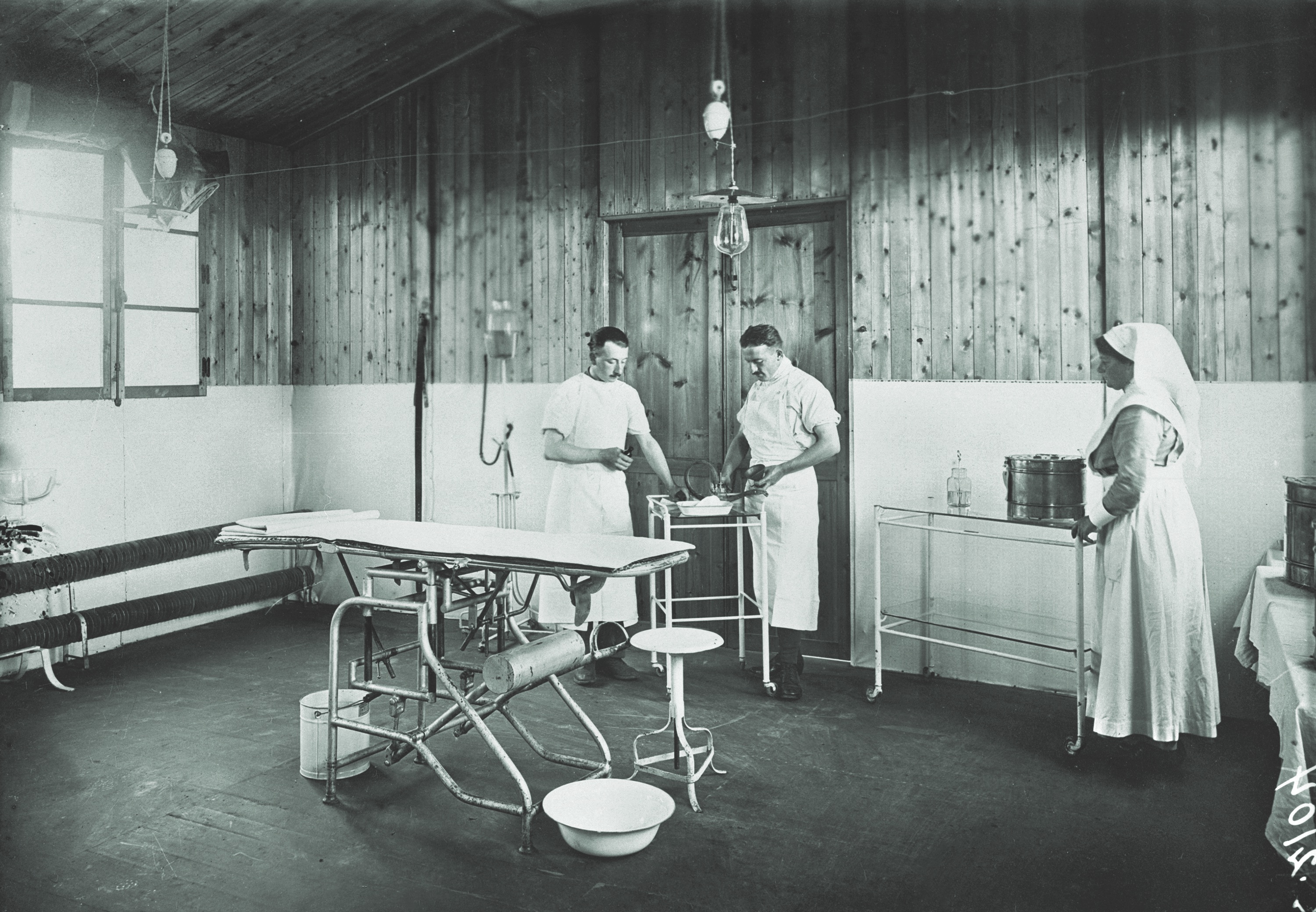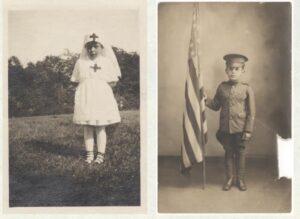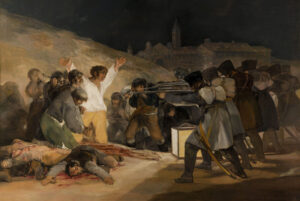In 1915 Ellen La Motte volunteered to work in a hospital near the Western Front. Then she was censored for describing what she saw.
In August 1916, as World War I slogged into its third year, the Atlantic Monthly published a story by Ellen N. La Motte about her experiences as a volunteer nurse in a field hospital near the Western Front. The following month G. P. Putnam’s Sons published The Backwash of War: The Human Wreckage of the Battlefield as Witnessed by an American Hospital Nurse, a collection of La Motte’s stories. The book was an immediate success, but La Motte’s unflinching portrayals of the war’s horrific consequences caused the book to be banned in both England and France and later withdrawn from publication in the United States. In 1927, seven years before The Backwash of War was reissued in the United States, H. L. Mencken, the influential journalist and critic, called it “the most horrible war book ever written.”

While World War I was still raging in Europe, La Motte traveled to China, where she wrote a series of letters that she would publish in 1919 as Peking Dust. Drawing on her background as a public health nurse and the muckraking traditions of the day, La Motte soon emerged as a tireless crusader against opium trafficking. “The menace of opium is now threatening America,” she warned in The Opium Monopoly (1920), one of several books she wrote on the subject.
In 1935 La Motte all but retired from writing and advocacy work, devoting her energies, as she would later put it, to “my friends and the stock market.” She died in Washington, D.C., in 1961 at age 87.
More than 100 years after its original publication, The Backwash of War has been published in a new, expanded edition—it includes a comprehensive introduction and biography of La Motte by Cynthia Wachtell—by Johns Hopkins University Press. The story that follows, titled “Heroes,” is set in Hôpital Chirurgical Mobile No. 1, the French field hospital in Roesbrugge, Belgium, where La Motte worked. The hospital’s founder and director was Chicago heiress Mary Borden, to whom La Motte dedicated The Backwash of War.
WHEN HE COULD STAND IT NO LONGER, he fired a revolver up through the roof of his mouth, but he made a mess of it. The ball tore out his left eye, and then lodged somewhere under his skull, so they bundled him into an ambulance and carried him, cursing and screaming, to the nearest field hospital. The journey was made in double-quick time, over rough Belgian roads. To save his life, he must reach the hospital without delay, and if he was bounced to death jolting along at breakneck speed, it did not matter. That was understood. He was a deserter, and discipline must be maintained. Since he had failed in the job, his life must be saved, he must be nursed back to health, until he was well enough to be stood up against a wall and shot. This is War. Things like this also happen in peace time, but not so obviously.
At the hospital, he behaved abominably. The ambulance men declared that he had tried to throw himself out of the back of the ambulance, that he had yelled and hurled himself about, and spat blood all over the floor and blankets—in short, he was very disagreeable. Upon the operating table, he was no more reasonable. He shouted and screamed and threw himself from side to side, and it took a dozen leather straps and four or five orderlies to hold him in position, so that the surgeon could examine him. During this commotion, his left eye rolled about loosely upon his cheek, and from his bleeding mouth he shot great clots of stagnant blood, caring not where they fell. One fell upon the immaculate white uniform of the Directrice, and stained her, from breast to shoes. It was disgusting. They told him it was La Directrice, and that he must be careful. For an instant he stopped his raving, and regarded her fixedly with his remaining eye, then took aim afresh, and again covered her with his coward blood. Truly it was disgusting.
To the Médecin Major it was incomprehensible, and he said so. To attempt to kill oneself, when, in these days, it was so easy to die with honour upon the battlefield, was something he could not understand. So the Médecin Major stood patiently aside, his arms crossed, his supple fingers pulling the long black hairs on his bare arms, waiting. He had long to wait, for it was difficult to get the man under the anesthetic. Many cans of ether were used, which went to prove that the patient was a drinking man. Whether he had acquired the habit of hard drink before or since the war could not be ascertained; the war had lasted a year now, and in that time many habits may be formed. As the Médecin Major stood there, patiently fingering the hairs on his hairy arms, he calculated the amount of ether that was expended—five cans of ether, at so many francs a can—however, the ether was a donation from America, so it did not matter. Even so, it was wasteful.
At last they said he was ready. He was quiet. During his struggles, they had broken out two big teeth with the mouth gag, and that added a little more blood to the blood already choking him. Then the Médecin Major did a very skillful operation. He trephined [cut a hole in] the skull, extracted the bullet that had lodged beneath it, and bound back in place that erratic eye. After which the man was sent over to the ward, while the surgeon returned hungrily to his dinner, long overdue.
IN THE WARD, THE MAN WAS A BAD PATIENT. He insisted upon tearing off his bandages, although they told him that this meant bleeding to death. His mind seemed fixed on death. He seemed to want to die, and was thoroughly unreasonable, although quite conscious. All of which meant that he required constant watching and was a perfect nuisance. He was so different from the other patients, who wanted to live. It was a joy to nurse them. This was the Salle of the Grands Blessés, those most seriously wounded. By expert surgery, by expert nursing, some of these were to be returned to their homes again, réformés, mutilated for life, a burden to themselves and to society; others were to be nursed back to health, to a point at which they could again shoulder eighty pounds of marching kit, and be torn to pieces again on the firing line. It was a pleasure to nurse such as these. It called forth all one’s skill, all one’s humanity. But to nurse back to health a man who was to be court-martialed and shot, truly that seemed a dead-end occupation.
They dressed his wounds every day. Very many yards of gauze were required, with gauze at so many francs a bolt. Very much ether, very much iodoform [a chloroform-like compound then widely used as an antiseptic dressing for wounds and sores], very many bandages—it was an expensive business, considering. All this waste for a man who was to be shot, as soon as he was well enough. How much better to expend this upon the hopeless cripples, or those who were to face death again in the trenches.
The night nurse was given to reflection. One night, about midnight, she took her candle and went down the ward, reflecting. Ten beds on the right hand side, ten beds on the left hand side, all full. How pitiful they were, these little soldiers, asleep. How irritating they were, these little soldiers, awake. Yet how sternly they contrasted with the man who had attempted suicide. Yet did they contrast, after all? Were they finer, nobler, than he? The night nurse, given to reflection, continued her rounds.
In bed number two, on the right, lay Alexandre, asleep. He had received the Médaille Militaire for bravery. He was better now, and that day had asked the Médecin Major for permission to smoke. The Médecin Major had refused, saying that it would disturb the other patients. Yet after the doctor had gone, Alexandre had produced a cigarette and lighted it, defying them all from behind his Médaille Militaire. The patient in the next bed had become violently nauseated in consequence, yet Alexandre had smoked on, secure in his Médaille Militaire. How much honour lay in that?
Here lay Félix, asleep. Poor, querulous, feeble-minded Félix, with a foul fistula, which filled the whole ward with its odour. In one sleeping hand lay his little round mirror, in the other, he clutched his comb. With daylight, he would trim and comb his moustache, his poor, little drooping moustache, and twirl the ends of it.
Beyond lay Alphonse, drugged with morphia, after an intolerable day. That morning he had received a package from home, a dozen pears. He had eaten them all, one after the other, though his companions in the beds adjacent looked on with hungry, longing eyes. He offered not one, to either side of him. After his gorge, he had become violently ill, and demanded the basin in which to unload his surcharged stomach.
Here lay Hippolyte, who for eight months had jerked on the bar of a captive balloon, until appendicitis had sent him into hospital. He was not ill, and his dirty jokes filled the ward, provoking laughter, even from dying Marius. How filthy had been his jokes—how they had been matched and beaten by the jokes of others. How filthy they all were, when they talked with each other, shouting down the length of the ward.
Wherein lay the difference? Was it not all a dead-end occupation, nursing back to health men to be patched up and returned to the trenches, or a man to be patched up, court-martialed and shot? The difference lay in the Ideal.
One had no ideals. The others had ideals, and fought for them. Yet had they? Poor selfish Alexandre, poor vain Félix, poor gluttonous Alphonse, poor filthy Hippolyte—was it possible that each cherished ideals, hidden beneath? Courageous dreams of freedom and patriotism? Yet if so, how could such beliefs fail to influence their daily lives? Could one cherish standards so noble, yet be himself so ignoble, so petty, so commonplace?
At this point her candle burned out, so the night nurse took another one, and passed from bed to bed. It was very incomprehensible. Poor, whining Félix, poor whining Alphonse, poor whining Hippolyte, poor whining Alexandre—all fighting for La Patrie. And against them the man who had tried to desert La Patrie.
So the night nurse continued her rounds, up and down the ward, reflecting. And suddenly she saw that these ideals were imposed from without—that they were compulsory. That left to themselves, Félix, and Hippolyte, and Alexandre, and Alphonse would have had no ideals. Somewhere, higher up, a handful of men had been able to impose upon Alphonse, and Hippolyte, and Félix, and Alexandre, and thousands like them, a state of mind which was not in them, of themselves. Base metal, gilded. And they were
all harnessed to a great car, a Juggernaut, ponderous and crushing, upon which was enthroned Mammon, or the Goddess of Liberty, or Reason, as you like. Nothing further was demanded of them than their collective physical strength—just to tug the car forward, to cut a wide swath, to leave behind a broad path along which could follow, at some later date, the hordes of Progress and Civilization. Individual nobility was superfluous. All the Idealists demanded was physical endurance from the mass.
Dawn filtered in through the little square windows of the ward. Two of the patients rolled on their sides, that they might talk to one another. In the silence of early morning their voices rang clear.
“Dost thou know, mon ami, that when we captured that German battery a few days ago, we found the gunners chained to their guns?” MHQ
[hr]
This article appears in the Summer 2019 issue (Vol. 31, No. 4) of MHQ—The Quarterly Journal of Military History with the headline: Experience | ‘This is War’

Want to have the lavishly illustrated, premium-quality print edition of MHQ delivered directly to you four times a year? Subscribe now at special savings!





